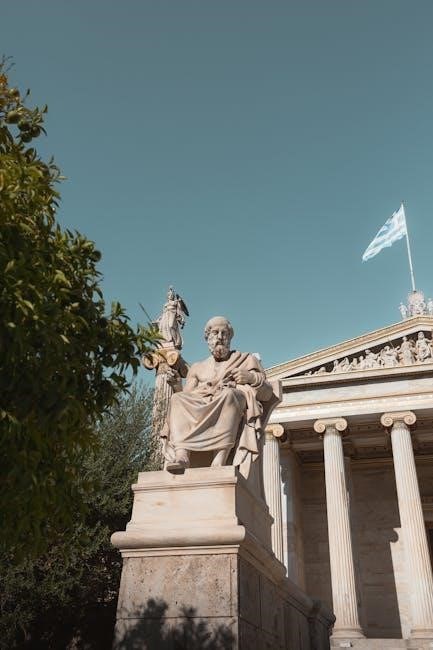
plato meno pdf
Plato’s Meno explores the nature of virtue, knowledge, and learning through a Socratic dialogue, offering insights into the theory of recollection and the paradox of learning.
Overview of the Dialogue and Its Significance
Plato’s Meno is a rich philosophical dialogue that delves into the nature of virtue, knowledge, and learning. It begins with Meno, a young aristocrat, questioning whether virtue can be taught or acquired through practice. Socrates explores this inquiry, introducing the theory of recollection, which posits that learning is a process of remembering eternal truths. The dialogue is significant for its exploration of epistemology and ethics, offering insights into Plato’s broader philosophical framework. The slave boy experiment exemplifies Socrates’ method of questioning, demonstrating how innate knowledge can be awakened. This dialogue is a cornerstone of Platonic thought, addressing fundamental questions about human understanding and moral development.
The Context of the Meno in Plato’s Works
Plato’s Meno is part of his middle-period dialogues, where he explores the theory of forms and the immortality of the soul. It bridges earlier Socratic dialogues, which focused on ethics, with later works like The Republic, delving into metaphysics. The dialogue reflects Plato’s shift toward more systematic philosophy, emphasizing the idea that knowledge is recollection of eternal truths; Its themes of virtue and education align with Plato’s broader project of redefining knowledge and reality.
The character of Meno, a young aristocrat, represents the challenges of teaching virtue, while Socrates’ method highlights the importance of inquiry. The dialogue’s structure and themes showcase Plato’s evolving philosophical framework, making it a pivotal work in understanding his thought.
Historical and Cultural Background
The Meno is set in Ancient Greece, with Meno, a young Thessalian aristocrat, embodying cultural and political ties to Athens, reflecting the era’s societal and philosophical dynamics.
The Setting of the Dialogue in Ancient Greece
The dialogue is set in ancient Greece, specifically in Athens, during a time of political and philosophical inquiry. Meno, a young aristocrat from Thessaly, visits Athens and engages in a discussion with Socrates. Thessaly, known for its wealth and equestrian traditions, provides a cultural backdrop that contrasts with the intellectual climate of Athens. The setting reflects the broader context of Greek city-states’ interactions and the exchange of ideas. Meno’s visit highlights the connections between different regions and their intellectual elites. The dialogue’s setting in Athens, a hub of philosophy and politics, underscores the significance of the discussion on virtue, knowledge, and education.
The Role of Meno and Other Characters
Meno, a young aristocrat from Thessaly, plays a central role in the dialogue as Socrates’ interlocutor, questioning the nature of virtue and its acquisition. His aristocratic background and curiosity drive the philosophical inquiry. Other characters, such as Anytus, represent opposing views, critiquing Socrates’ methods and highlighting societal tensions. The slave boy, though unnamed, is pivotal in demonstrating the theory of recollection, showcasing innate knowledge. These characters collectively advance the dialogue’s exploration of knowledge, virtue, and learning, each serving distinct roles in Plato’s philosophical narrative.
Key Themes and Philosophical Questions
The Nature of Virtue and Its Acquisition
The dialogue examines whether virtue is teachable, innate, or attained through practice, sparking debates on moral development and knowledge acquisition.
The Theory of Recollection and Learning
Plato introduces the concept of recollection, suggesting learning is remembering eternal truths, challenging traditional notions of education and knowledge formation.
The Paradox of Learning and Knowledge
Meno’s paradox questions how one can seek knowledge they don’t possess, prompting Socrates to explore the interplay between ignorance and discovery.
The Nature of Virtue and Its Acquisiton
The Meno dialogue centers on the question of whether virtue can be taught or if it is acquired through practice or innate ability. Socrates challenges Meno to define virtue, leading to a deeper exploration of its nature. Meno initially believes virtue varies by gender and social status, but Socrates argues for a universal definition. The discussion reveals tension between the idea of virtue as knowledge and its practical application. Socrates suggests that virtue must be teachable if it is a form of knowledge, sparking debate. This inquiry highlights Plato’s emphasis on the pursuit of wisdom and the interplay between knowledge and action, setting the stage for his theory of recollection.
Plato’s Meno introduces the theory of recollection, arguing that learning is not acquisition but the rediscovery of innate knowledge from past lives. Socrates demonstrates this with the slave boy experiment, guiding him to uncover geometric truths without teaching, showing that knowledge is inherent. This theory resolves the paradox of learning, explaining how one can seek knowledge they already possess. It underscores the immortality of the soul and the idea that education is a process of recollection. This concept central to Plato’s philosophy suggests that true understanding is latent within us, awaiting awakening through questioning and reflection.
The Meno introduces a profound paradox: if one already knows something, inquiry is unnecessary, but if one does not know, they cannot recognize what they seek. Plato addresses this through the theory of recollection, suggesting knowledge is innate and learning is remembering. Socrates demonstrates this with the slave boy experiment, showing untutored individuals can grasp complex truths, implying knowledge exists within the soul. This resolves the paradox by asserting that learning is not acquisition but rediscovery. The dialogue thus highlights the interplay between knowledge and recollection, emphasizing the soul’s immortality and the preexistence of knowledge. This concept remains central to Plato’s epistemology, linking learning to eternal truths.

Structure and Composition of the Dialogue
The dialogue is structured around Socratic questioning, featuring the slave boy experiment, which illustrates the theory of recollection and underscores the dialogue’s methodical composition.
The Opening Scene and Its Implications
The Meno begins abruptly, with Meno arriving in Athens and immediately posing a question to Socrates about whether virtue can be taught. This direct opening, devoid of typical Socratic preliminaries, emphasizes the urgency of the inquiry. Meno’s presence as a young, influential Thessalian nobleman adds a political dimension, while the inclusion of Anytus, a future critic of Socrates, foreshadows broader societal tensions. The scene establishes the dialogue’s central theme: the nature of virtue and its acquisition. By bypassing introductory formalities, Plato focuses attention on the philosophical debate, highlighting the Socratic method’s direct engagement with essential questions. This opening sets the tone for a dialogue that interweaves philosophy with social and political realities.
The Use of the Socratic Method
The Socratic Method in Plato’s Meno is a cornerstone of the dialogue, as Socrates engages Meno in a series of probing questions to explore the nature of virtue and knowledge. This method encourages critical thinking and self-examination, challenging Meno’s assumptions and fostering a deeper understanding. Through persistent inquiry, Socrates guides Meno toward uncovering truths latent within him, illustrating the theory of recollection. The method not only reveals the limitations of Meno’s knowledge but also demonstrates how dialectical questioning can lead to intellectual and philosophical growth. This approach emphasizes the importance of dialogue and collaboration in the pursuit of wisdom, making it a central element of Plato’s philosophical framework.
The Role of the Slave Boy Experiment
The slave boy experiment in Plato’s Meno is a pivotal demonstration of Socrates’ theory of recollection. Socrates engages an uneducated slave boy in a geometric inquiry, guiding him to discover mathematical truths through questioning. This process illustrates that knowledge is not acquired through teaching but is instead a recollection of innate ideas. The experiment underscores the idea that the soul possesses eternal knowledge, which can be awakened through proper questioning and reflection; This scene not only highlights Socrates’ pedagogical method but also reinforces the dialogue’s central theme: the nature of learning and the immortality of the soul. The experiment serves as a compelling argument for the theory of recollection, making it a cornerstone of the dialogue’s philosophical inquiry.

Analysis of Major Concepts
The Concept of the Forms and Their Relevance
The dialogue introduces the theory of Forms, suggesting they are eternal, perfect entities that underlie all phenomena, providing a foundation for understanding reality and knowledge.
In Plato’s Meno, the concept of the Forms emerges as a central philosophical idea. The Forms are abstract, timeless, and perfect entities that serve as the ultimate reality underlying the imperfect sensory world. They represent the true essence of things, such as justice, beauty, and virtue, which are imperfectly reflected in the physical realm. The relevance of the Forms lies in their role as the objects of true knowledge, accessible not through sense perception but through reason and recollection. This concept underscores Plato’s belief in a higher, eternal realm of being that governs human understanding and morality, making the Forms a cornerstone of his philosophical framework.
The Idea of the Immortality of the Soul
In the Meno, Plato introduces the concept of the immortality of the soul through Socrates’ dialogue with Meno. Socrates argues that the soul exists before birth and will continue to exist after death, suggesting that knowledge is not acquired but rather recollected. This theory implies that learning is a process of rediscovering eternal truths rather than gaining new information. The idea is central to Plato’s broader philosophy, as it supports his belief in the Forms and the eternal nature of reality. By positing the soul’s immortality, Plato establishes a metaphysical foundation for his views on knowledge, virtue, and the ultimate goal of human existence.
The Relationship Between Knowledge and Virtue
In Plato’s Meno, the relationship between knowledge and virtue is central, as Socrates investigates whether virtue can be taught. He posits that knowledge is essential for virtue, enabling wise and just decisions. The theory of recollection suggests that knowledge is innate, and learning is about remembering. Thus, virtue, rooted in knowledge, isn’t taught but recalled. Plato underscores that true virtue arises from understanding eternal truths, making education crucial in uncovering these truths.

Characters and Their Roles
Socrates guides the dialogue with his questioning method, while Meno, a young noble, struggles to understand virtue. Anytus opposes Socratic ideas, and the slave boy demonstrates recollection.
Socrates as the Guide and Questioner
Socrates plays a central role in the Meno as the guide and questioner, employing his signature Socratic method to provoke critical thinking. Through his probing questions, he challenges Meno and other characters to examine their assumptions about virtue, knowledge, and learning. Socrates’ approach is both confrontational and enlightening, as he seeks to uncover truths rather than provide direct answers. His dialogue with Meno reveals the young nobleman’s intellectual struggles, while his interaction with the slave boy demonstrates the potential for innate knowledge to emerge through questioning. Socrates’ method not only highlights the complexity of philosophical inquiry but also underscores the importance of self-reflection and intellectual humility in the pursuit of understanding.
Meno’s Struggles with Understanding
Meno, a young nobleman from Thessaly, embodies the challenges of grasping philosophical concepts. His confusion about virtue’s nature and acquisition reflects his limited understanding of Socratic methods. Initially, Meno is torn between the ideas of Gorgias and Protagoras, unsure whether virtue can be taught. Socrates’ questioning further unsettles him, leading to frustration. The dialogue illustrates Meno’s difficulty in moving beyond superficial notions, highlighting his reliance on preconceived ideas. Despite Socratic guidance, Meno struggles to embrace the concept of recollection, showing the resistance to new knowledge. His journey symbolizes the human struggle to transcend conventional thinking and embrace deeper truths, making him a relatable figure in Plato’s exploration of learning and virtue.
The Significance of Anytus in the Dialogue
Anytus plays a crucial role in Plato’s Meno as a representative of Athenian society and its tensions with Socratic philosophy. His appearance underscores the broader societal opposition to Socrates, as he openly disapproves of Socratic methods and threatens him. Anytus’s character symbolizes the conflict between traditional Athenian values and the radical ideas of Socrates. His presence also highlights the political undercurrents of the dialogue, foreshadowing the eventual trial of Socrates. Anytus’s skepticism toward the idea that virtue can be taught aligns him with the sophists, creating a stark contrast with Socrates’ belief in the educability of virtue. This tension adds depth to the exploration of knowledge, education, and societal norms in the dialogue.

Political and Social Implications
The dialogue critiques Athenian society, highlighting tensions between aristocratic influence and democratic values, with Meno representing Thessalian elites and Anytus embodying opposition to Socratic ideas.
The Critique of Athenian Society
In Plato’s Meno, the dialogue subtly critiques Athenian society by challenging its values and political norms. The character of Anytus, an Athenian aristocrat, embodies the societal elite’s hostility toward philosophical inquiry; His dismissive attitude toward Socrates reflects the broader tension between philosophy and the political establishment. The dialogue also highlights the superficiality of Athenian education and the prioritization of wealth and power over virtue. Plato uses the Meno to question the Athenian belief in the inherent superiority of the aristocracy, advocating instead for a society guided by reason and justice. This critique aligns with Plato’s broader philosophical vision, emphasizing the need for ethical leadership and the reform of societal structures.
The Role of Education in Plato’s Philosophy
In Plato’s philosophy, as explored in the Meno, education is central to the development of virtue and the pursuit of knowledge. Plato advocates for an educational system that fosters critical thinking and ethical reasoning, emphasizing the importance of dialectical inquiry. The theory of recollection, demonstrated through the slave boy experiment, suggests that learning is not mere acquisition but the awakening of innate knowledge. This underscores Plato’s belief in the immortality of the soul and the existence of the Forms, which education should help individuals access. The educator’s role is to guide students in uncovering truths, rather than imparting information. Plato’s vision of education extends beyond intellectual growth, aiming to cultivate virtuous individuals capable of leading just societies. This dialogue critiques Athenian education, advocating for a more inclusive and philosophically grounded approach.
Modern Relevance and Interpretations
Plato’s Meno remains influential in contemporary debates, particularly in educational theory, emphasizing the theory of recollection and its implications for modern views on learning and knowledge acquisition.
The Meno in Contemporary Philosophical Debates
Plato’s Meno remains a cornerstone in contemporary philosophical discussions, particularly in debates about education, epistemology, and the nature of learning. The dialogue’s exploration of the theory of recollection has inspired modern educators to reconsider how knowledge is acquired, emphasizing the idea that learning is a process of rediscovering innate truths. Additionally, the paradox of learning—questioning how one can seek what they do not know—resonates in discussions about the limits of human knowledge. Scholars also draw parallels between Meno’s struggles with understanding and modern critiques of teaching methods. The dialogue’s focus on virtue as a teachable trait continues to influence debates in moral philosophy and cognitive science, making it a timeless work in both classical and contemporary thought.
The Dialogue’s Influence on Educational Theory
Plato’s Meno has profoundly shaped educational theory by emphasizing the role of inquiry and dialogue in learning. The slave boy experiment illustrates how knowledge can be “drawn out” through questioning, challenging traditional rote memorization. This approach advocates for interactive and critical thinking-based education, influencing modern pedagogical methods. The dialogue’s emphasis on the teacher’s role as a guide rather than an authority aligns with contemporary educational practices. By suggesting that learning is a process of recollection, Plato challenges educators to foster environments where students uncover knowledge through exploration. This philosophy continues to inspire debates on effective teaching and the nature of understanding, making the Meno a cornerstone of educational theory and practice.